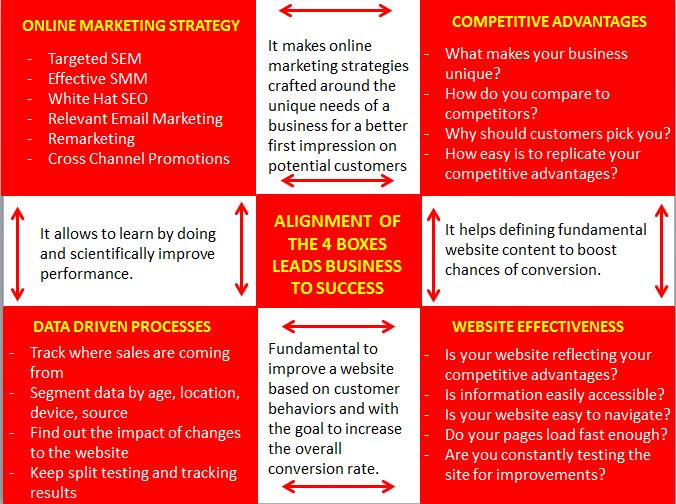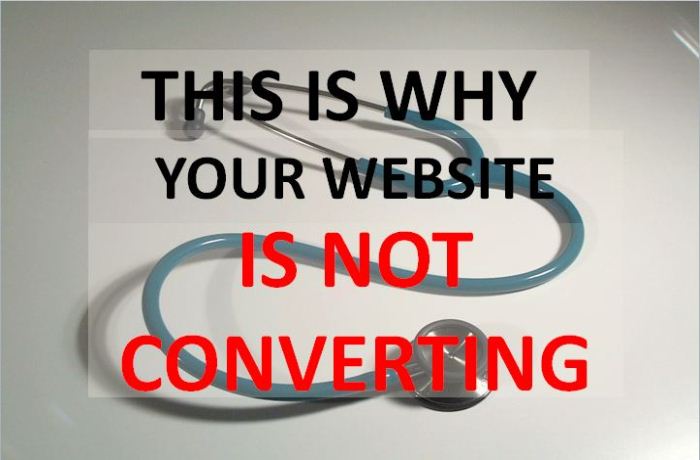Many companies today get frustrated when their digital marketing plans fail. Forums and LinkedIn conversations are filled with business owners trying to understand what’s wrong with their campaigns. Too often, people forget sales and conversions are just the tip of the iceberg in a long and complex system called the sales funnel.
This article will focus on explaining what makes a successful online marketing strategy and will hopefully help you increase the return on your marketing investment.
Is Your Online Marketing Strategy Well Planned Out?
Online marketing strategies serve as the engine of a business. They should generate qualified leads via your website, which means making a mistake can affect your long-term success.
Your online marketing strategy needs to include but won’t be limited to:
- Targeted SEM campaigns
- Effective SMM strategies
- White hat SEO techniques
- Top notch email marketing campaigns
- Remarketing on Google, Facebook, Twitter, etc..
Once you have a good plan in place, don’t forget to create an optimization plan. It is extremely important to set up a system that allows you to tune up based on statistically relevant data.
What Are The Competitive Advantages of Your Business?
Finding out your competitive advantages doesn’t take very long. By answering a few questions, you can determine what you have to offer that your competitors don’t. The most difficult part is identifying which competitive advantages will make the difference in the decision-making process of your potential customers.
Try to answer the following questions while looking for your competitive advantages:
- What makes your business so unique?
- How does your service compare to your competitors? Where are you better than them (and vice-versa)?
- Why should customers contact you and not somebody else?
- How easy is to replicate your competitive advantage? Can competitors develop it easily?
Overall, a good competitive advantage is unique, difficult to imitate, and valuable to the customers. The more valuable and difficult to imitate it is, the more people will be willing to pay a premium price for your service.
How Effective is Your Website?
Many companies know their website could be improved, but figure it is good enough to generate leads. Most of the times, this is an excuse for a failed marketing plan. The real story is most marketing campaigns are harmed by bad websites.
This issue is very complex and both the website and the marketing can be a problem.
When it comes down to the website, you must ask the following questions:
- Is our website reflecting the competitive advantage of our business in a proper and clear way?
- Is information easily accessible? Users love to find what they are looking for RIGHT AWAY.
- Is our website easy to navigate?
- Do our pages load fast enough?
- Are we constantly a/b testing the site for improvements?
Imagine your website as a store in a mall. You can have the best walk in traffic, but if you are failing to convert this qualified traffic, it is time to change the way you are selling your merchandise.
Common best practices include:
- Making sure users understand who and what you are about in the first 10 second of the navigation. You will improve your bounce rate and increase engagement on your site.
- Test each step in the process to obtain a sale or a lead. In case of a lead generation site, you have to test the content and layout of the landing page. In case of a sales oriented site, you need to test several parts of the funnel (landing page, order page, and any other additional page).
- Connecting your website to all of your social media to add credibility and a personal touch to the website.
Is Data Affecting Your Decisions?
Data is a gold mine. The more data you have about your website and marketing activities the better off you are. How can you use your data to improve performance? First, find out what sort of data is relevant to your business and move forward from there.
Generally, the most useful data is:
- Where are your sales are coming from? Are you generating sales via mobile or desktop? Is there any referral site generating a good amount of conversions?
- Segment data by gender, age, location, device and source and learn what’s most profitable. You can also use this information to run highly segmented remarketing campaigns
- Identify marketing campaigns with low time on page and high bounce rate and optimize them.
- Test to find out how a website change affects the performance of your website.
The more you test the more you will learn. Take advantage of data.
How Does it All Play Together?
All of the steps I just discussed contribute to creating a successful website. Here is a graph connecting the dots for us:

In Conclusion
The success of a website doesn’t depend on one single element – it depends upon the whole sales process. You must have a well oiled process where all parts are constantly optimized. What is your experience with successful / unsuccessful websites? Share your experiences in the comments below and let’s build great content for people looking to convert more!




